Arts Feature: Recommended Books, 2020
Compiled by Bill Marx
An eclectic round-up of the favorite books of the year from our critics.
Roberta Silman
I was lucky enough to review three books this year that have lasting value: Invisible Years, Homeland Elegies, and Apeirogon. Two books I did not review but which came my way are worth a look.
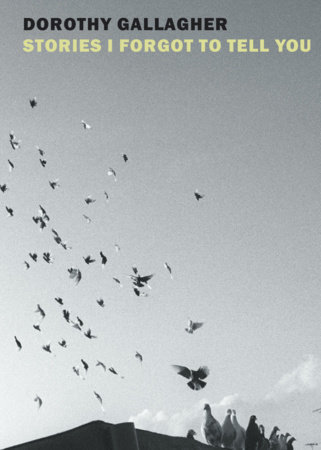
The first is The Collected Stories, Shirley Hazzard, FSG, $28. It includes two earlier collections: Cliffs of Fall and People in Glass Houses, as well as some uncollected stories and vignettes. Unfortunately, these are not among Hazzard’s finest work. The stories in the first group are mostly about adultery and unhappy young women looking in on other people’s lives; although the prose is pleasurable, the content seems either quaint at times, or a little stale. And the stories in the second group, a group of connected tales about a young woman working at an organization like the United Nations where Hazzard herself worked, seem to have been written out of anger or spite, not really good impulses for sitting down and trying to create a world. The group of uncollected stories reinforces my feelings that stories found at the bottom of the desk drawer usually ought to stay there. So I am not sure how this book will enhance Hazzard’s reputation. For she was a superb writer when she was at the top of her form; for proof we have her novella Evening of the Holiday and the novels The Bay of Noon and The Transit of Venus, as well as parts of her last novel, The Great Fire. For those she has plenty of fans, and rightly so. But for those who feel they have to read everything by her, this Collected volume may be of interest.
The second book, Stories I Forgot to Tell You by Dorothy Gallagher (New York Review of Books, $22.95) is not only a charming journey through grief, but an indispensable primer on how to work your way through it. The volume is made up of brief, unconnected stories, sometimes in the form of a letter, to her late husband Ben Sonnenberg, who was the founder and editor of Grand Street. Theirs was a late marriage and filled with many challenges, for he had a long bout with multiple sclerosis before he died at 73. But it was a happy one, filled with respect and humor and a rare kind of devotion. As Gallagher wanders through all sorts of memories while trying to recover from his sudden death, she paints a wonderfully vivid picture of her life with him then, and now, alone. Its very randomness is like a long conversation that has the ring of truth. If you have lost a loved one, as I did two years ago, this book will bring comfort and perspective, and a hopeful kind of peace.
Vince Czyz
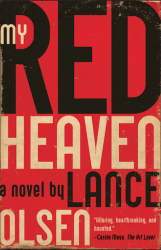
Lance Olsen’s My Red Heaven borrows elements of collage, quantum mechanics, and palimpsest to give us a heady meditation on the historical, aesthetic, and even metaphysical repercussions of the lives and events that intersect in Berlin on June 10, 1927. Arts Fuse review
Preoccupied with death, decay, disease, fragmentation, dissolution, and failure, Robert Glick’s Two Californias is full of humor, ambitious writing, structural innovation, and thoughtful angles on human existence. Arts Fuse review
Steve Provizer
I found Shakespeare in a Divided America (Penguin Press, $27) a fascinating read. Author James Shapiro uses key events in US history to show how key players on both sides of our country’s most contentious issues have understood the appeal of the Bard and have used his work as a way to try to exert influence at crucial political and cultural junctures. Events and figures covered include: John Quincy Adams and the actress Fanny Kemble, the war with Mexico, the burning of the Astor Place Opera House and New York City riots, Lincoln’s assassination, restricting immigration, the making of the musical Kiss Me Kate, the production history of the film Shakespeare in Love, and the controversy generated by a production of Julius Caesar mounted by New York City’s Shakespeare in the Park. Arts Fuse review
Tess Lewis
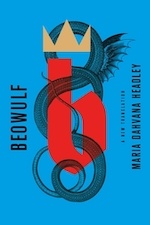 The highlight of my reading year was Maria Dahvana Headley’s unbridled, chest-thumping new translation of Beowulf. Shamelessly and luxuriantly anachronistic, Headley channels the spirit of the epic and finally does true justice to Grendel’s kick-ass mother.
The highlight of my reading year was Maria Dahvana Headley’s unbridled, chest-thumping new translation of Beowulf. Shamelessly and luxuriantly anachronistic, Headley channels the spirit of the epic and finally does true justice to Grendel’s kick-ass mother.
“Grendel’s mother,
warrior-woman, outlaw, meditated on misery…
carried on a wave of wrath, crazed with sorrow,
looking for someone to slay, someone to pay in pain
for her heart’s loss.”
Kai Maristed
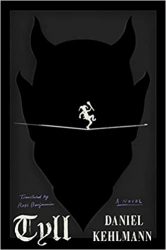
Tyll: A Novel by Daniel Kehlmann. Translated from the German by Ross Benjamin (Pantheon Books, $26.95). Why: Fresh, original, moving, a deeply researched and confidently irreverent re-living of the Thirty Years War through a jester’s eyes. If only Hilary Mantel’s tomes had half the agility and wit. Arts Fuse review
I found myself dreaming about the characters in Margot Livesey’s The Boy in the Field (Harper Collins, $26.99). Livesey’s insightful eye captures the small details that illuminate and transform people’s everyday, mysterious lives. A thoughtful, atmospheric, and timeless story of youth, when so much fiction today is trying to ride the headlines. Art Fuse review
Ed Meek
A Certain Clarity: Selected Poems by Lawrence Joseph. Joseph writes genuinely bold and vital poetry. Arts Fuse review
In Twilight of Democracy: The Lure of Authoritarianism Anne Applebaum points out that “meritocracy and competition do not create community.” And, deep down, people prefer community. As someone who witnessed Poland’s turn toward authoritarianism, Applebaum helps readers understand the Trump phenomenon. Arts Fuse review
In Just Us: An American Conversation, Claudia Rankine comes off as a disgruntled but interesting guest at the dinner party who keeps turning the conversation back to subjects that make others uncomfortable — but they are well worth talking and thinking about. Arts Fuse review
Thomas Doherty
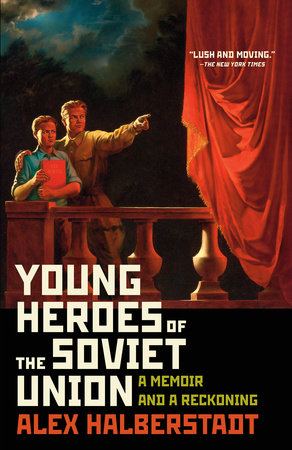 The best read I had all year was Alex Halberstadt’s astonishing Young Heroes of the Soviet Union (Penguin Random House, 320 pages), a haunting blend of memoir and history, where the pages of a personal family album flip over seamlessly into the Big Picture pageant. Russian-born but made in America, Halberstadt, previously the author of Lonely Avenue: The Unlikely Life and Times of Doc Pomus (2007), travels to Lithuania, Russia, and Ukraine to tug on the roots of two generations of a family entwined with more than its share of the tragic history of the 20th century — Hitler’s Holocaust and Stalin’s Terror.
The best read I had all year was Alex Halberstadt’s astonishing Young Heroes of the Soviet Union (Penguin Random House, 320 pages), a haunting blend of memoir and history, where the pages of a personal family album flip over seamlessly into the Big Picture pageant. Russian-born but made in America, Halberstadt, previously the author of Lonely Avenue: The Unlikely Life and Times of Doc Pomus (2007), travels to Lithuania, Russia, and Ukraine to tug on the roots of two generations of a family entwined with more than its share of the tragic history of the 20th century — Hitler’s Holocaust and Stalin’s Terror.
Halberstadt’s journey down nightmare lane includes a bracing encounter with his grandfather, a former NKVD thug and bodyguard of Joseph Stalin, and an estranged father, who “brought home a record of Bill Haley’s ‘Rock Around the Clock’ engraved on an X-ray of a lung” and immediately defected, imaginatively, to America. It is beautifully written and historically astute — the kind of book where you ration out the pages each night because you want to savor it. Of his grandparents, Halberstadt writes, they “lived at a time when the buffer between history and biography became nearly imperceptible,” and, as he learns, the same is true for himself, and all of us.
Bill Marx
One of the downsides of editing a magazine is that it cuts mightily into the time it takes to write for it. I am constantly reading, but I have trouble carving out the hours to complete reviews. So here, before the end of the year, are brief notices about 2020 books that I feel comfortable recommending — heavy on the arts criticism, though I have been most impressed by books that connect the arts to the wider world of politics, economics, ecology, etc.
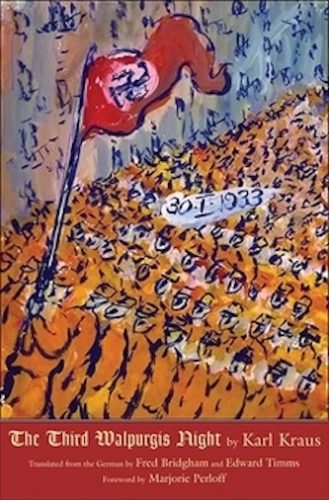
I was determined to find the time to commend Karl Kraus’s The Third Walpurgis Night: The Complete Text, translated from the German by Fred Bridgham and Edward Timms (Yale University Press, $35). Overlooked by the greater media, this is a drop-dead analysis of the rhetorical barbarities of the Hitler cult from one of the greatest journalists of the 20th century.
The book stands as an inspiring model for what’s needed (steely courage, a strong stomach, prophetic verve) to excoriate the language of autocracy. Kraus’s brilliant jeremiad dismembers Nazi dishonesty in detail, its opportunistic obfuscation of words and facts, its embrace of lies, grievance, viciousness, and self-serving hyperbole. The critic assumes the satiric stance of utter astonishment at the perfect articulation of utter stupidity: “On all sides, nothing but stupor, people spellbound by the deceptive magic of an idea which consists of not having any.” My review.
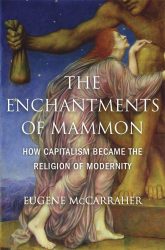 The Enchantments of Mammon: How Capitalism Became the Religion of Modernity by Eugene McCarraher. (Harvard University Press, $39.95.) This hefty volume was published in November 2019, but it took a while for me to get through its 679 pages. The journey was worth it. As it ranges over the centuries, this expansive polemic details how “under capitalism, money occupies the ontological throne from which God has been evicted.” McCarraher savages the sacralized fantasy of perpetual economic growth — purportedly guided by the dictates of reason — promulgated on the Left (Neo-liberalism and Socialism) and the Right. Against this worship of accumulation are set the admirable but futile efforts of those who, over time, have agitated against the idolatry of lucre. Is it possible for us to turn our eyes away from this false God? “We will not be saved by our money, our weapons, or our technological virtuosity,” McCarraher writes, “we might be rescued by the joyful and unprofitable pursuits of love, beauty, and contemplation.”
The Enchantments of Mammon: How Capitalism Became the Religion of Modernity by Eugene McCarraher. (Harvard University Press, $39.95.) This hefty volume was published in November 2019, but it took a while for me to get through its 679 pages. The journey was worth it. As it ranges over the centuries, this expansive polemic details how “under capitalism, money occupies the ontological throne from which God has been evicted.” McCarraher savages the sacralized fantasy of perpetual economic growth — purportedly guided by the dictates of reason — promulgated on the Left (Neo-liberalism and Socialism) and the Right. Against this worship of accumulation are set the admirable but futile efforts of those who, over time, have agitated against the idolatry of lucre. Is it possible for us to turn our eyes away from this false God? “We will not be saved by our money, our weapons, or our technological virtuosity,” McCarraher writes, “we might be rescued by the joyful and unprofitable pursuits of love, beauty, and contemplation.”
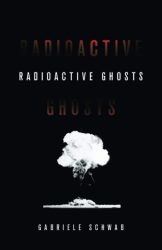 Another powerful volume that takes a fierce look at the intersection of arts and politics was Radioactive Ghosts by Gabriele Schwab (University of Minnesota Press, $28). Her thesis:
Another powerful volume that takes a fierce look at the intersection of arts and politics was Radioactive Ghosts by Gabriele Schwab (University of Minnesota Press, $28). Her thesis:
The ontological insecurity generated by the intervention of the Bomb and enforced by the proliferation of nuclear power plants establishes a qualitative leap in the formation of subjectivity. Whether or not we are aware of it, we are constituted as nuclear subjects, endowed with a nuclear unconscious that profoundly shapes our being in the world. Moreover, the ontological insecurity generated by what I call nuclear necropolitics has defining and lasting consequences not only for psychopolitics but also for biopolitics and the larger ecology of mind and planetary life that molds the formation of subjectivity.
Focusing on the legacies of the Manhattan Project, Hiroshima, and nuclear energy politics, the book clearly examines the ways that visual art, literature, film, and popular culture have expressed our radical insecurity. She caps her illuminating study with some terrific pages on Samuel Beckett’s Happy Days. A worthy addition to Robert Jay Lifton’s work on the nefarious resonances of nuclear catastrophes (real and imagined), particularly because it explores these public/private implications in terms of race, gender, and class.
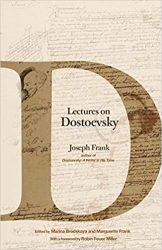 One of my favorite interviewees during my years at the Boston Phoenix was scholar-critic Joseph Frank, the author of a five-volume, magisterial critical biography of Dostoevsky. The posthumously published Lectures on Dostoevsky (Princeton University Press, $29.95) are his Stanford lectures on the work of the Russian giant. They are wonderfully succinct explorations of the major novels (for some reason, The Devils is excluded) and suggest what a marvelous teacher Frank was — they exude the glamour of thoughtfulness. Robin Feuer Miller sums up their appeal in the book’s foreword:
One of my favorite interviewees during my years at the Boston Phoenix was scholar-critic Joseph Frank, the author of a five-volume, magisterial critical biography of Dostoevsky. The posthumously published Lectures on Dostoevsky (Princeton University Press, $29.95) are his Stanford lectures on the work of the Russian giant. They are wonderfully succinct explorations of the major novels (for some reason, The Devils is excluded) and suggest what a marvelous teacher Frank was — they exude the glamour of thoughtfulness. Robin Feuer Miller sums up their appeal in the book’s foreword:
Joseph Frank’s intellectual rigor combines in these Lectures with a seeming ease and fluidity of pacing that is in fact carefully constructed. Without fireworks or brinkmanship, without trying overly hard to engage in classroom theatrics, he offers up both himself and his subject as representations of the value of intellectual, philosophical, and aesthetic inquiry.
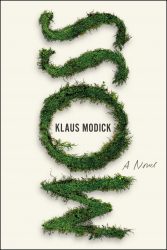
I did not read a lot of fiction this year. Klaus Modick’s short novel Moss, translated from the German by David Herman (Bellevue Literary Press, $16.99), is a powerful exercise in eco-fiction that stuck with me. In our coming variations on Crime and Punishment, future novelists will have to grapple with a worldwide crime — the degradation of the climate crisis — and how radically it will change the way we think and live. Writers will no doubt be chronicling the battles waged to cool down a rapidly warming world — dramatizing the economic, social, political, and cultural challenges. But, as we come to terms with our destruction of the environment (by killing nature we are killing ourselves), fiction will also be called on to articulate how tragically we have diminished our consciousness of reality.
Moss is a quiet, at times abstract, meditation in which a mind registers the death of nature, told from the perspective of a renowned, now dying, botanist who, retiring to his childhood home in the German countryside, experiences an epiphany about his life as a celebrated scientist. The self and society’s demand for classification has alienated him from reality. As he dies, he realizes that “separations, distinctions become impossible and meaningless. The I overlaps with the All. The All begins to moss over — to mossify — the I.”
Modick’s writing, at its best, presents the “mossification” of the mind, combining clinical observation with philosophical lyricism, as in this powerful passage about how moss grows in a cemetery:
The rock mosses here settle only on the granite rocks, on the boulders from the ice age. They cover the surface with dark, almost black cushion. They love an erotics of death. In their growth, they track all the uneven areas in the stones’ surface. They anchor themselves in — become almost inseparable from — the stone. They cover the pious sayings. They grow over the names. They spread out over the dates. They love very cold temperatures, yet they survive the summers. They go to sleep along with the winters, persevering in a patient stillness until the cold returns and they awaken. Then they once again extend out over the stones. But they avoid the marble. They know that it comes from the south. It is too warm, too smooth, too youthful. The rock mosses love the cold. And the old. In the springtime they go to sleep.
Moss. Tomb of stones.
I am currently enjoying Peter Brooks’s Balzac’s Lives (NYRB, $18.95), a lively study of the great French writer as seen through the lens of a handful of the 2,472 characters he created in his epic series The Human Comedy. Among those featured: Père Goriot‘s Eugène de Rastignac, The Wild Ass’s Skin‘s Raphaël de Valentin, and The Duchess of Langeais‘s Antoinette de Langeais. I am also relishing Raymond N. MacKenzie’s new, fully annotated translations (University of Minnesota Press, $19.95 each) of Balzac’s masterpieces Lost Illusions and its follow-up, Splendeurs et misères des courtisanes, here given the title Lost Souls.
Tagged: Bill-Marx, Ed Meek, Kai Maristed, Roberta Silman, Tess Lewis

Balzac, oui oui! May I also recommend Cousin Pons (presumed English title) which moved me to laughter and tears two years ago. Balzac’s clear eyed cynicism, Balzac’s tender heart.
Yes, but Balzac was also one of the pioneers of dramatizing the “enchantments of mammon.” Money puts just about everyone under its spell in his world — according to critic Harry Levin, “it is Balzac’s zeal for tracing financial relationships that links cause to effect, plot to character, and volume to volume in the Comédie humaine.” That is one of the strengths of these annotated editions — they clarify who is doing what to who for how much. So yes, laughter, tears, and cynicism — but the pervasive power of profit underneath it all.